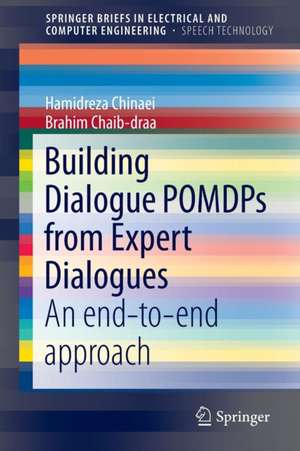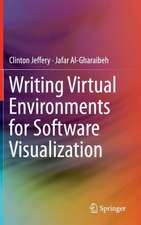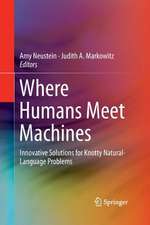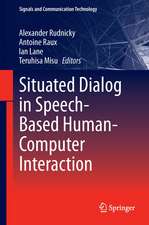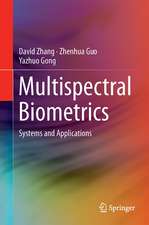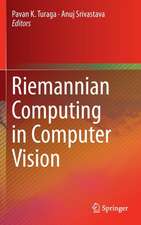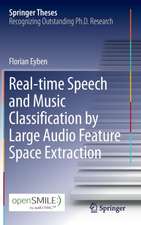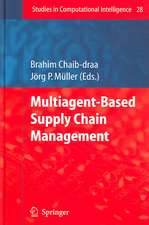Building Dialogue POMDPs from Expert Dialogues: An end-to-end approach: SpringerBriefs in Speech Technology
Autor Hamidreza Chinaei, Brahim Chaib-draaen Limba Engleză Paperback – 16 feb 2016
Din seria SpringerBriefs in Speech Technology
-
 Preț: 357.70 lei
Preț: 357.70 lei -
 Preț: 344.64 lei
Preț: 344.64 lei -
 Preț: 337.37 lei
Preț: 337.37 lei -
 Preț: 379.48 lei
Preț: 379.48 lei -
 Preț: 378.12 lei
Preț: 378.12 lei -
 Preț: 387.38 lei
Preț: 387.38 lei -
 Preț: 375.45 lei
Preț: 375.45 lei -
 Preț: 377.95 lei
Preț: 377.95 lei -
 Preț: 377.95 lei
Preț: 377.95 lei - 20%
 Preț: 293.48 lei
Preț: 293.48 lei -
 Preț: 375.62 lei
Preț: 375.62 lei -
 Preț: 379.09 lei
Preț: 379.09 lei -
 Preț: 379.09 lei
Preț: 379.09 lei -
 Preț: 377.18 lei
Preț: 377.18 lei -
 Preț: 381.98 lei
Preț: 381.98 lei -
 Preț: 380.45 lei
Preț: 380.45 lei -
 Preț: 344.52 lei
Preț: 344.52 lei -
 Preț: 375.62 lei
Preț: 375.62 lei -
 Preț: 375.45 lei
Preț: 375.45 lei - 20%
 Preț: 322.02 lei
Preț: 322.02 lei -
 Preț: 377.57 lei
Preț: 377.57 lei -
 Preț: 379.09 lei
Preț: 379.09 lei -
 Preț: 374.68 lei
Preț: 374.68 lei -
 Preț: 378.92 lei
Preț: 378.92 lei -
 Preț: 343.51 lei
Preț: 343.51 lei -
 Preț: 441.85 lei
Preț: 441.85 lei -
 Preț: 375.45 lei
Preț: 375.45 lei -
 Preț: 376.22 lei
Preț: 376.22 lei -
 Preț: 379.68 lei
Preț: 379.68 lei -
 Preț: 375.07 lei
Preț: 375.07 lei -
 Preț: 410.94 lei
Preț: 410.94 lei -
 Preț: 377.35 lei
Preț: 377.35 lei -
 Preț: 344.75 lei
Preț: 344.75 lei -
 Preț: 379.68 lei
Preț: 379.68 lei -
 Preț: 375.62 lei
Preț: 375.62 lei -
 Preț: 376.22 lei
Preț: 376.22 lei -
 Preț: 377.73 lei
Preț: 377.73 lei
Preț: 378.54 lei
Nou
Puncte Express: 568
Preț estimativ în valută:
72.44€ • 77.46$ • 60.39£
72.44€ • 77.46$ • 60.39£
Carte tipărită la comandă
Livrare economică 17 aprilie-01 mai
Preluare comenzi: 021 569.72.76
Specificații
ISBN-13: 9783319261980
ISBN-10: 3319261983
Pagini: 119
Ilustrații: VII, 119 p. 22 illus., 21 illus. in color.
Dimensiuni: 155 x 235 x 7 mm
Greutate: 0.19 kg
Ediția:1st ed. 2016
Editura: Springer International Publishing
Colecția Springer
Seria SpringerBriefs in Speech Technology
Locul publicării:Cham, Switzerland
ISBN-10: 3319261983
Pagini: 119
Ilustrații: VII, 119 p. 22 illus., 21 illus. in color.
Dimensiuni: 155 x 235 x 7 mm
Greutate: 0.19 kg
Ediția:1st ed. 2016
Editura: Springer International Publishing
Colecția Springer
Seria SpringerBriefs in Speech Technology
Locul publicării:Cham, Switzerland
Public țintă
ResearchCuprins
1 Introduction.- 2 A few words on topic modeling.- 3 Sequential decision making in spoken dialog management.- 4 Learning the dialog POMDP model components.- 5 Learning the reward function.- 6 Application on healthcare dialog management.- 7 Conclusions and future work.
Notă biografică
Hamidreza Chinaei is a postdoctoral fellow at the Computer Science Department in University of Toronto under the supervision of Dr. Frank Rudzicz through an NSERC Engage Fund with IBM Canada. Dr. Chinaei has received his PhD in 2013 in Computer Science from Laval University on the application of machine learning for speech and natural language processing tasks, and MMath in Computer Science from the University of Waterloo on semantic query optimization. He has received the Industrial Track Student Scholarship and Award from the 2012 Canadian AI Conference and the Best Student Paper Award from the International Conference on Agents and Artificial Intelligence in 2009.
Brahim Chaib-draa received a Diploma in Computer Engineering from the École Supérieure d’Électricité (SUPELEC) de Paris, Paris, France, in 1978 and a Ph.D. degree in Computer Science from the Université du Hainaut-Cambrésis, Valenciennes, France, in 1990. In 1990, he joined the Department of Computer Science and Software Engineering at Laval University, Quebec, QC, Canada, where he is a Professor and Group Leader of the Decision for Agents and Multi-Agent Systems (DAMAS) Group. His research interests include agent and multiagent computing, machine learning and complex decision making. He is the author of several technical publications. Dr. Chaib-draa is a member of ACM and AAAI and senior member of the IEEE Computer Society.
Brahim Chaib-draa received a Diploma in Computer Engineering from the École Supérieure d’Électricité (SUPELEC) de Paris, Paris, France, in 1978 and a Ph.D. degree in Computer Science from the Université du Hainaut-Cambrésis, Valenciennes, France, in 1990. In 1990, he joined the Department of Computer Science and Software Engineering at Laval University, Quebec, QC, Canada, where he is a Professor and Group Leader of the Decision for Agents and Multi-Agent Systems (DAMAS) Group. His research interests include agent and multiagent computing, machine learning and complex decision making. He is the author of several technical publications. Dr. Chaib-draa is a member of ACM and AAAI and senior member of the IEEE Computer Society.
Textul de pe ultima copertă
This book discusses the Partially Observable Markov Decision Process (POMDP) framework applied in dialogue systems. It presents POMDP as a formal framework to represent uncertainty explicitly while supporting automated policy solving. The authors propose and implement an end-to-end learning approach for dialogue POMDP model components. Starting from scratch, they present the state, the transition model, the observation model and then finally the reward model from unannotated and noisy dialogues. These altogether form a significant set of contributions that can potentially inspire substantial further work. This concise manuscript is written in a simple language, full of illustrative examples, figures, and tables.
- Providesinsights on building dialogue systems to be applied in real domain
- Illustrateslearning dialogue POMDP model components from unannotated dialogues in aconcise format
- Introducesan end-to-end approach that makes use of unannotated and noisy dialogue forlearning each component of dialogue POMDPs
Caracteristici
Provides insights on building dialogue systems to be applied in real domain Illustrates learning dialogue POMDP model components from unannotated dialogues in a concise format Introduces an end-to-end approach that makes use of unannotated and noisy dialogue for learning each component of dialogue POMDPs Includes supplementary material: sn.pub/extras
